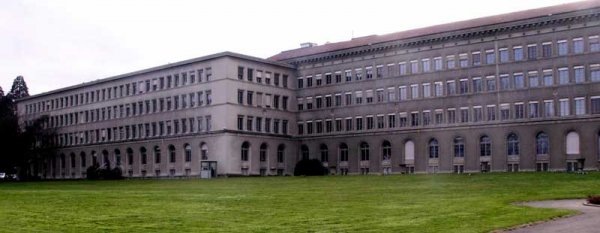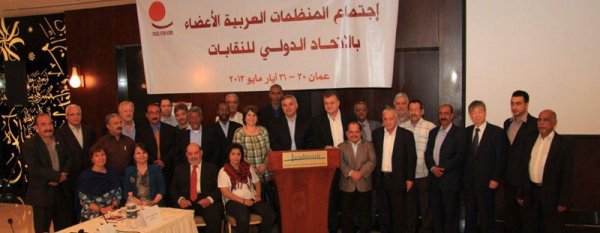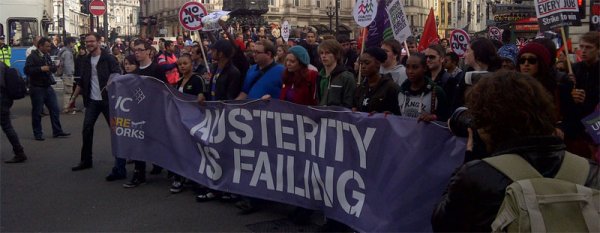| ITUC E-News is produced by the International Trade Union Confederation |
Chile: Time for Starbucks to Stop Union Busting
Information Technology Agreement – countries are warned on consequences
ITUC : New Structure to strengthen democratic and independent trade unionism in the Arab countries
Time to reverse three years of destructive austerity
New “FIFA” Laws Strip World Cup Workers’ Rights in Russia
 |
23 October 2013: The ITUC is extremely concerned about the situation of workers’ rights at Starbucks in Chile. In October, as it announced record profits, the company rejected all Starbucks Workers´ Union demands, included in a draft collective agreement.
Alleging damage to its competitiveness, the company has said it cannot cover basic benefits to workers such as meals and commuting expenses, as well as sick pay rights.
The majority of workers are young people under 25, ironically referred to by its internal regulations as “partners”.
The company was sentenced four times for violation of trade union rights in 2012, and the Chilean Supreme Court has recently upheld an appeal court ordering it to pay a $50,000 fine and to negotiate a collective agreement with the union.
It is clear for the ITUC that Starbucks is using all its resources to derail the process of collective bargaining and, through intimidation and direct retaliation, discourages workers from joining the union.
“Workers’ rights at Starbucks in Chile deserve to be respected as any other rights. Starbucks is claiming everywhere that it is a socially responsible company. It is now time to see it concretely,” said Sharan Burrow, ITUC General Secretary.
To show your solidarity, you can take action and tell Starbucks to negotiate a good faith with workers in Chile by clicking here.
 |
22 October 2013: The ITUC together with 163 other trade union and civil society organisations and trade unions are raising concerns over a proposed expansion of the Information Technology Agreement (“ITA II”) being negotiated at the World Trade Organisation. A joint letter to WTO member points to the damage the proposals would do to the development of IT industry in developing countries.
The Agreement has been in force since 1997, and several WTO Members are now negotiating its expansion to cover information technology (IT) goods created since then. The Agreement covers IT goods that comprise about ten per cent of the global merchandise, more than the agricultural merchandise.
The letter warns the participating countries that the Agreement could further harm workers and restrict the prospect of industrialisation for participating developing countries. “The necessary diffusion of technology and the need to overcome the digital divide within and across countries require policy space for governments in order to implement industrial policies that enable them to develop their own industries or to increase the ownership of production of ICTs (information and communication technologies) in supply chains in which they operate,” it says.
As the negotiations on the ITA-II resume in Geneva this week, trade unions and civil society are calling for the negotiations to focus on expanding the potential for decent jobs. They also warn that an expanded ITA will likely benefit mainly multinational enterprises that control patent monopolies and impede technology transfer. “Governments negotiating the ITA-II must guarantee a fair level of transparency and accessibility, and they must conduct impact assessments that take into account financial instability, the persisting jobs crisis and other major challenges so as to be able to engage in informed negotiations,” ITUC General Secretary Sharan Burrow said.
The letter also calls on developing countries, and particularly LDCs (least developed countries), to think twice before they take binding commitments under the Agreement in light of the market access benefits they can enjoy on a non-reciprocal basis even if they stay out of the Agreement. The ITA-II is negotiated on a Most-Favoured-Nation basis.
 |
11 October 2013: At the request of 17 national trade union centres from the Arab region (in Algeria, Bahrain, Egypt, Libya, Jordan, Mauritania, Morocco, Oman, Palestine Tunisia and Yemen), the ITUC General Council meeting in Brussels (9-11 October) has endorsed the process of creating a new structure for the Arab countries.
The founding instruments of the new structure will be submitted to the forthcoming 3rd ITUC World Congress in Berlin for adoption in conformity with the ITUC Constitution.
Considering the grave challenges which face the democratic and independent trade union movement in the Arab world and the urgent need to respond to these, the General Council gave its support to this new ITUC structure, which will give immediate priority to tackling frequent and massive violations of fundamental liberties, including trade union rights, to defending workers in the context of growing poverty and unemployment and to fighting against social injustice, which particularly affects women, young people and the poorest, including migrant workers.
ITUC General Secretary Sharan Burrow welcomed the decision, saying “Trade unions are at the forefront of the fierce and long struggle which is taking place across the Arab world, which sets democrats and progressives against authoritarian and retrograde forces. The trade unionists of the Arab World have expressed their urgent need for a specific space to better unify their forces and put in place a common strategy. The ITUC General Council has today expressed its full solidarity with their struggle in favour of democratic, progressive and independent trade unionism in this part of the world. »
“This new sub-regional structure will help us project a strong and unified voice in our ongoing struggle to defend and build democratic, progresssive and independent trade unions in the Arab countries, » said Houcine Abbassi, General Secretary of the UGTT Tunisia and Acting President of the new Arab sub-regional structure of the ITUC during its transitional period up to the ITUC Congress.
 |
10 October 2013: The international trade union movement urges the International Monetary Fund and the World Bank, which are holding their annual meetings in Washington this weekend (Washington, 11-13 October), to reverse the harmful austerity and deregulatory policies that have contributed to a new global downturn and continued high joblessness.
The urgency of the need to change course was made evident by the IMF’s updated economic forecasts made public on Tuesday, in which the Fund stated its expectation that the sudden slowdown in several large emerging economies will last several years and put the global economy on a substantially lower growth path than before the 2008-2009 crisis. IMF forecasters’ statement that growth may return to most of Europe in 2014 because the “Troika” has relaxed its fiscal deficit targets should put an end once and for all the mistaken belief that the austerity and deregulation policies of the past three years have been good for growth.
Sharan Burrow, General Secretary of the ITUC, stated, “It is high time for the IMF to stop its promotion of destructive austerity programmes and the dismantling of workers’ protection that have been central features of its lending programmes and policy advice in Europe. We are pleased that the Fund finally seems to acknowledge what unions have been saying about austerity, but it should also end its efforts to reduce protections for vulnerable workers and dismantle collective bargaining institutions.”
Concerning President Jim Yong Kim’s plans for a reorganisation of the World Bank Group, Sharan Burrow stated, “We are pleased to see the World Bank announce its intention to pay greater attention to the employment and distributional impact of its policies. Trade unions want to see both the Bank and the IMF place decent work at the centre of their policy objectives. The Bank should play a much more active role than it has in helping workers make the transition from informal to formal employment and in supporting the UN’s Social Protection Floor initiative.”
The ITUC’s general secretary also encouraged that World Bank “to follow up on its forward-looking research on the devastating impact of climate change and help to mobilise the investments necessary for a just transition to a low-carbon future.”
A detailed statement submitted by the ITUC and its Global Unions partners to the annual meetings of the IMF and World Bank is available in English, French, Spanish and German
 |
9 October 2013: The ITUC is backing its Russian affiliates, FNPR and KTR, in opposing exemptions from Russian labour law for the 2018 World Cup, which would deprive tens of thousands of Russian and migrant workers of basic legal protections covering working hours , overtime and its remuneration, weekend and night work and a range of other standards.
The law, which was adopted by the Russian Duma this summer, would apply until the end of 2018 and effectively allow FIFA and its partners, including Russian and multinational companies, to set working conditions outside the framework of Russian law.
Sharan Burrow, ITUC General Secretary, said, “The World Cup is becoming notorious for exploitation of workers, in Qatar, in Brazil and now with this unprecedented new law in Russia. The Russian case contradicts FIFA President Sepp Blatter’s assertion last week that ‘FIFA cannot interfere with the labour rights of any country’. Governments should stand up to the commercial interests which make huge gains out of the World Cup at great cost to local workers and the community. FIFA itself needs to take responsibility to ensure that that the people who deliver the facilities and services are protected, not exploited. ”
With several construction workers having already lost their lives building new stadiums in St Petersburg and Kazan, Russian unions are concerned that removing worker protections will lead to more exploitation, deaths and injuries. In 2012, in result of the Tatarstan prosecutor-organised audit, half of 50 subcontractors at the Kazan site were penalised for failing to provide proper health and safety equipment and training. According to media, three workers died building the St Petersburg stadium and several more were injured, while two fatalities have been recorded by the labour inspection in Kazan.
In Brazil, President Dilma Rouseff has intervened to veto a provision in the 2014 “World Cup Law” which would have exempted legal provisions on payment of wages to “volunteers”. “Fair play for only the 90 minutes of a football match is not enough. FIFA and its local World Cup Organising Committees should ensure fair play for the very people who deliver this iconic sporting event,” said Burrow.
|
Quote “The World Cup is becoming notorious for exploitation of workers, in Qatar, in Brazil and now with this unprecedented new law in Russia.”– Sharan Burrow, ITUC General Secretary – |